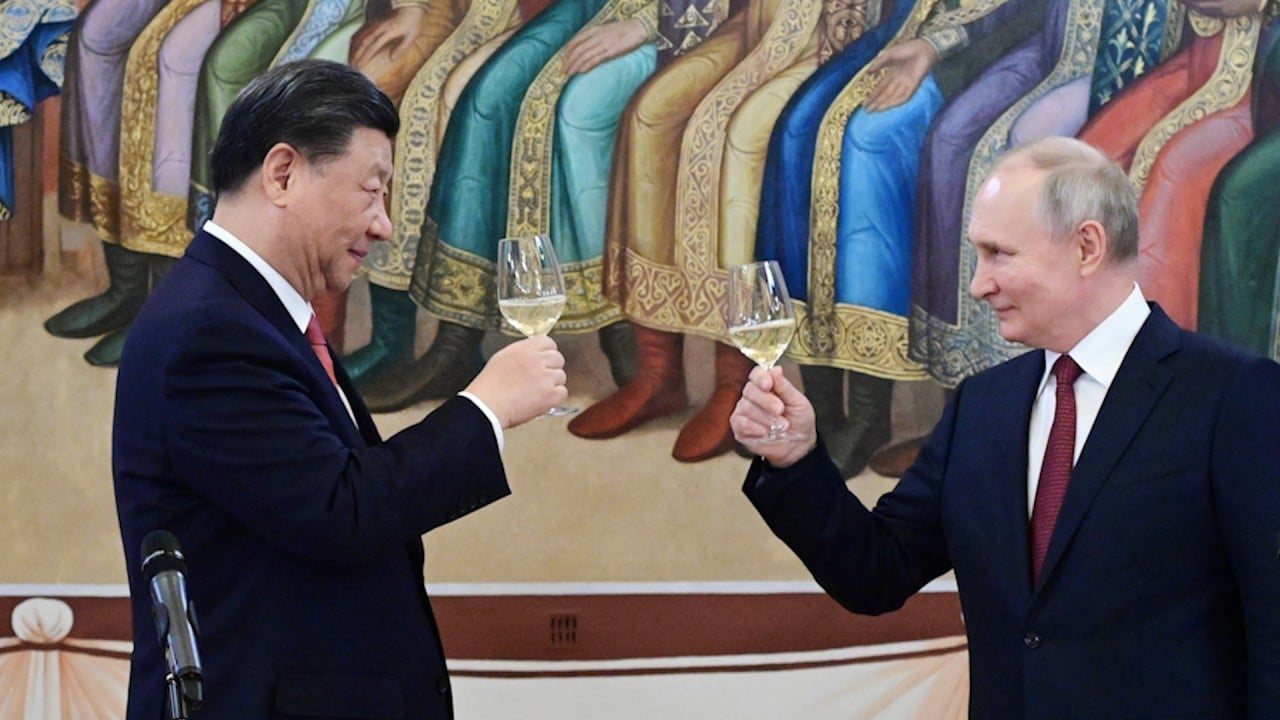
EU chief calls for muscular policy to counter China’s ‘alternative world order’
- Combative speech from Ursula von der Leyen sets tone ahead of expected meeting with Chinese President Xi Jinping in Beijing next week
- The EU is not seeking to decouple from China but ‘de-risk’ ties in both economic and political ways, European Commission president insists
European Commission chief Ursula von der Leyen has accused China of pursuing a “systemic change of the international order” with Beijing at its centre.
As part of this, the bloc would consider restricting European companies’ investments in China in sensitive sectors such as robotics, quantum computing and artificial intelligence.
“We have to recognise that the world and China have changed in the last three years – and we need to reassess CAI in light of our wider China strategy,” she said, in a rare comment on the deal that would appear to draw a line under its future.
China envoy renews call to revive stalled CAI trade pact with EU
“The CCP’s clear goal is a systemic change of the international order with China at its centre. We have seen it with China’s positions in multilateral bodies which show its determination to promote an alternative vision of the world order,” von der Leyen said, in a reference to the ruling Communist Party of China.
The German politician said Xi’s visit to Moscow last week was a “stark reminder” of Beijing’s global aims.
“Far from being put off by the atrocious and illegal invasion of Ukraine, President Xi is maintaining his ‘no limits friendship’ with Putin’s Russia,” she said.
Von der Leyen rejected China’s proposals for peace in Ukraine, but said: “China has a responsibility to play a constructive role in advancing a just peace.”
“Ukraine will define the terms of a just peace, that requires the withdrawal of invading troops. Any peace plan which would in effect consolidate Russian annexations is simply not a viable plan,” she said, adding that Beijing’s close ties with Moscow would “be a determining factor for EU-China relations going forward”.
Von der Leyen insisted, however, that the EU was not seeking to decouple from China, and reiterated her earlier suggestion of “de-risking” the relationship both in economic and political ways.
Most trade was not “risky”, she said, but China’s alleged history of forced technology transfer, and its shift in focus to “control and security” – at the expense of economic opening – required a shift in policy from Europe.
“Our relations are not black or white – and our response cannot be either. This is why we need to focus on de-risking – not decoupling. And this is part of the reason why I will soon be visiting Beijing together with President Macron,” von der Leyen said.
At Davos, EU leader stresses ‘de-risking, rather than decoupling’ from China
But while she left the door open for collaboration on areas like biodiversity, climate change and global health, the European Commission president said that space for working together was narrowing, particularly in the economic sphere.
China had turned the page on the era of “reform and opening” and was “moving into a new era of security and control”, von der Leyen said.
“We saw this earlier this month, when President Xi repeated his pledge to make the Chinese military a ‘great wall of steel that effectively safeguards national sovereignty, security, and development interests’.”
“All companies in China, for example, are already obliged by law to assist state intelligence-gathering operations and to keep it secret,” she added, in a sign that Brussels would continue to squeeze Chinese firms over security concerns.
US, EU claim progress against China reliance via ‘critical raw materials club’
Her wide-ranging address panned China on everything from human rights to economic coercion.
China was “becoming more repressive at home and more assertive abroad”, she said.
“The grave human rights violations occurring in Xinjiang are also a cause for great concern, as laid out in the recent report of the UN High Commissioner for Human Rights.”

Their top objective is to enlist China’s help to end the war in Ukraine, though observers are sceptical as to how far Beijing is willing to go on that front.
“This cannot happen unless the right conditions occur,” said Fabian Zuleeg, chief executive at the European Policy Centre think tank, which co-hosted the event where von der Leyen delivered the keynote address.
The other host was the Mercator Institute for China Studies – an entity targeted by Beijing’s sanctions in 2021.
“I want to express my solidarity with you and all the other individuals and institutions who have been unfairly sanctioned by the Chinese government,” von der Leyen told the researchers.


